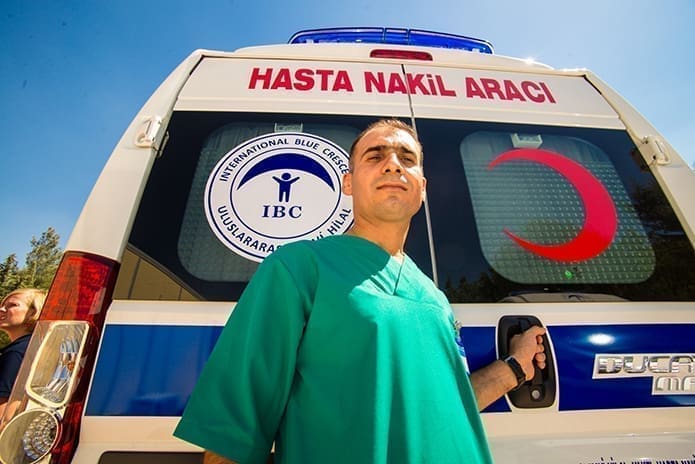 CNS photo/Michael Swan, The Catholic Register
CNS photo/Michael Swan, The Catholic RegisterTurkey
Interfaith hospital on Turkish border helps Syrians save themselves
By MICHAEL SWAN, Catholic News Service | Published October 10, 2013
KILIS, Turkey (CNS)—Ali Ahmad was walking with his young son one evening after dark. It was after they had fled Aleppo, Syria, and begun their lives as refugees in southern Turkey. It was a clear, starry night.
“He looks up at the stars and he says, ‘Dada, are they coming to bomb us?’ I, I…. ”Ahmad could not finish the sentence. Even if his English was better, how could a father explain that his son is afraid of the stars?
“All of us Syrians, we need psychologists. All of us. We have seen our houses destroyed, all kinds of things,” Ahmad said over lunch with the staff at Malteser International’s new joint project with the International Blue Crescent Relief and Development Foundation in Kilis. The two international aid organizations—one German Catholic and the other Turkish Muslim—have come together to launch a 28-bed mobile hospital in the border town where locals say the normal population of 88,000 has nearly doubled with the influx of refugees.
Ahmad is head nurse at the mobile hospital, which officially opened Sept. 13. The doctors, nurses and support staff at the new hospital are all Syrian. They all left Syria reluctantly, fleeing the fighting that began in 2011. They saw the hospitals where they worked bombed, homes where they lived destroyed and sniper fire in Aleppo picking off one or two random civilians per day.
The trauma of seeing their country torn apart by a war they see as neither necessary nor resolvable has hit their children hardest.
“We adults, we can cope 80 percent,” said Syrian English teacher and translator Ole Nasser.
The grownups can fall back on their roles as teachers, doctors, husbands, wives, mothers and fathers. But the children have no mask to hide behind, she said. Few of them can imagine a future when images of destruction, randomness and death make up so much of their childhood experience, Nasser said.
Nasser’s former high school students from Aleppo have taken Syrian school exams in Kilis, and many are hoping to gain admission to universities in Turkey and other countries. She is proud of their achievements and their courage in pushing forward. She knows that, for the younger children, there is no easy path to anything like a normal life.
But the mobile hospital is a first step—a first, small contribution to a new Syria for the doctors and nurses. The new facility also will take some pressure off the local public hospital, which is struggling to handle a crush of patients, including people suffering extreme stress, hypertension, complications from untreated chronic conditions such as diabetes, as well as war wounded.
The mobile hospital is equipped and designed to travel. It can run off a generator or any source of electricity it finds. The high-tech container-treatment room includes a system for filtering the air. The four ambulances are well enough equipped that doctors could perform surgery in them if necessary.
But it all sits in a landscaped courtyard, hooked up to city electricity and water. As far as Kilis is concerned, the city now has a new annex to its hospital.
The Syrian doctors want to be in Syria now. They want to treat Syria’s wounds.
“If I were a general surgeon I never would have left,” said Dr. Mahmoud Mustafa, an ophthalmologist.
The Malteser-IBC hospital is in a neighborhood not far from downtown Kilis, flanked by a couple of feeding stations that also offer social services to refugees living in town. The 40,000 refugees renting rooms in the city are the majority. Another 20,000 refugees live in the first Kilis camp and an additional 13,000 in a newer camp. A very large site is being prepared for a third camp just north of Kilis.
A recent influx of refugees overwhelmed the official camps and resulted in Syrians sleeping in city parks. Turkish authorities and NGOs worked quickly to find places for the refugees, but locals claim they still find refugees sleeping all over the city.
The Malteser effort in Kilis goes beyond the hospital. The agency supports psycho-social work—counseling for traumatized refugees—and a school, again staffed by Syrians.
Everything they do is designed to be “part of any new Syria,” said Anja Simic, the Malteser program coordinator in Kilis.
“We’re not saving anybody. We’re helping Syrians to save themselves,” she said.